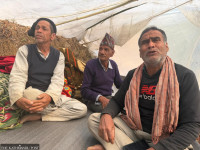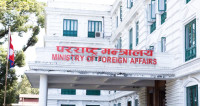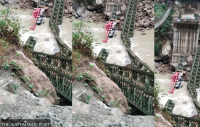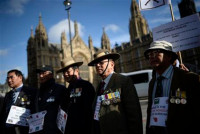National
‘Balen’ canes parties with the walking stick
Kathmandu voters rap Congress, UML on the knuckles as they pick a rapper, also a structural engineer, as their new mayor.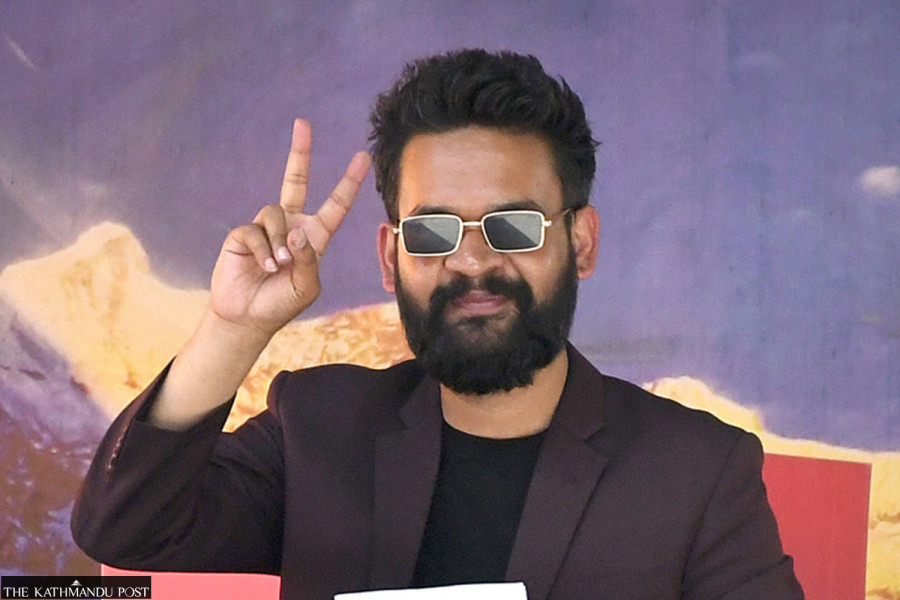
Binod Ghimire
The name’s ‘Balen’, Balendra Shah—the new mayor of Kathmandu Metropolitan City, the country’s largest metropolis and the federal capital.
Shah, 32, who is fondly called ‘Balen’, pulled off the biggest upset of this local election as he, as an independent candidate, left behind old guards like the Nepali Congress and the CPN-UML to become the Kathmandu mayor.
With his lead already more than the number of votes remaining to be counted as of Wednesday, an announcement is just a formality now.
When he filed his candidacy for the Kathmandu mayoral post—he was the first to file the nomination—not many knew of him. Some candidates like Keshav Sthapit of the CPN-UML even took a jibe at him. Balen got “lauro”, the walking stick, as his election symbol.
As campaigns started, some five months ago, it appeared he was a popular figure among the youth—the millennials and Gen Y—for his music.
A rapper, he was already a name to go among hip hop fans. And he is a structural engineer by profession.
Those who know Balen closely say he always believed that he had some responsibility towards society, which prompted him to contest the election.
According to his cousin Prashant Shah, Balen wanted to contest for the mayoral post in 2017 as well.
“From a young age, he was dissatisfied at the way the metropolitan city was being run. He would often say Kathmandu is beautiful and it can be developed as a liveable city,” Prashant told the Post. “The non-performance of the elected representatives prompted him to contest the elections.”
Balen’s family originally comes from Ekdara Rural Municipality in Mahottari district. He, however, was born in Naradevi, Kathmandu on April 27, 1990.
His father, Dr Ram Narayan Shah, an Ayurvedic doctor, was then posted at Naradevi Ayurvedic Hospital. The family currently lives in Gairigaun, Tinkune, near the airport.
“We are extremely happy,” Ram Narayan told the Post on Wednesday afternoon. “He used to write poems since childhood. If anything has given success to him then it is his dedication, hard work, commitment and humility.”
After completing his bachelor’s in civil engineering in Nepal, he went to Bangalore to pursue his master’s in structural engineering.
Bhupa Dev Shah, one of the core members of his team, said Balen would always bring social issues in his songs as he would say he did not want to be a mere spectator of the goings on.
“Someone had to come forward and clean up the mess,” said Bhupa. “Balen chanced an arm. People endorsed him and his idea.”
According to Bhupa, their team’s election campaign was mostly virtual—various platforms like Facebook and WhatsApp groups. The mayor aspirant believed in in-person campaigns and would meet people individually.
“Balen’s background as an artist helped a lot to connect him with the voters,” said Bhupa. “A youth member from each family campaigned for him and that became our biggest strength.”
By voting for Balen, Kathmandu’s electorate, which has an uncanny way of giving surprises, sent across a message that there is more than party politics. In Kathmandu, politicians like the late former prime minister Krishna Prasad Bhattarai and late Mangaladevi Singh, the wife of the late Ganesh Man Singh, have been given a taste of defeat in the past by the voters.
Balen was up against Sthapit, a two-time mayor of Kathmandu, and Congress leader Sirjana Singh, who comes from a family with an impressive political background. She is the wife of Prakash Man Singh, son of Ganesh Man and Mangala Devi.
“Fairly speaking, when we started off, we didn’t expect to receive the kind of support we actually did,” said Bhupa. “People have shown a huge trust in us.”
Balen has now upset the apple cart with the immense support of Kathmandu voters who were fed up with the outgoing mayor Bidya Sundar Shakya, who made himself a classic example of how not to be a mayor.
Things are not easy for him though in the coming days. As soon as the structural engineer assumes the mayoral office, he will inherit a heap of problems plaguing the city.
The list of what needs to be done in Kathmandu is endless.
Balen’s family and his team members say people trusted him because he made deliverable pledges that connect to people’s day-to-day lives, unlike other candidates who promised the moon.
In his election manifesto, he has listed his commitments under 28 different topics covering education, health, transportation, pollution control, digital government and corruption control. Improvement of infrastructure of public schools and quality of education, auditing private schools, setting up health clinics in every ward, free screening of breast and cervical cancer and improvement of public transportation are some of his promises.
Bhupa said Balen has a team of experts from different sectors to support him to achieve the goals he has set.
“We know there are challenges to perform but when you are accommodative and can take everyone together you can get work done without much difficulty,” he said. “Balen has that capacity. His best asset is that he is an extremely accommodative personality.”
Subash Parajuli, 36, a Tinkune resident, said he came to know about Balen only recently even though they are neighbours.
“I was not too close to Balen despite us being neighbours. I had just known him as a hip-hop artist. In the 2017 local elections, I had filed my candidacy for Ward 32 chair from Bibeksheel Nepali Party. Later, when the party merged with Sajha Party, I quit.”
He started following Balen only after he filed his candidacy for the mayoral post, he said.
“I actually liked his vision. And I decided to be a campaigner for him,” Parajuli told the Post. “Not only the youth, others who usually follow party politics too rallied behind him. That he is going to be the new mayor has given hope that we will see the change.”
On Wednesday afternoon, when it became certain that Balen would walk it, his mother, Durga Devi, was sitting on the veranda of the first floor of her house in Gairigaun.
“I don’t want to talk now, not until the final result is out,” said Durga Devi. “Since his childhood he was sincere. He is going to be the mayor of Kathmandu, and for a mother what can be a happier moment than this.”
The rapper-cum-structural engineer now will be leading the country’s biggest metropolitan city that has the highest budget [Rs18.9 billion for the current fiscal year] among the 753 local units.
Some have already started speculating if he will form a political party and whether he will be able to perform when other office bearers—deputy mayor and ward officials—are from other parties.
“He contested the election to work for the betterment of the Kathmandu Metropolitan City,” said Prashant, the cousin. “He will neither form any party nor join any existing parties.”
Along with Balen, UML’s Sunita Dangol is set to become deputy mayor of the Kathmandu Metropolitan City.
On Wednesday afternoon, Balen’s team thanked the electorate through a Facebook post saying the voters from the metropolitan city have shown their trust in them and that they can shoulder the responsibility of the city. They have urged everyone to rise above the win-defeat mindset. Urging the voters and supporters not to take out any victory rally, they have said they will jointly celebrate the day the promises in the manifesto are translated into reality.
“The path ahead is not easy. The real test of our campaign has just begun,” reads the post. “Keeping us alert is as important as the suggestions and support we have received so far. Please warn us if we lose the track.”
As Balen is set to take over Kathmandu, heralding a new era, at least two more independent candidates have defeated party candidates—in Dharan and Dhangadhi.
In Dharan Sub-Metropolitan City, Harka Sampang Rai won the election while in Dhangadhi, Gopal Hamal emerged victorious. Both were contesting for a second time after facing defeats in the 2017 election.
Political analysts say the victory of Balen and other independent candidates is the manifestation of people’s decreasing faith in parties and their leaders who have invariably failed when it comes to delivery.
Rajendra Maharjan, a political commentator, said people are supporting independent candidates because they believe they will work for the people more sincerely than the party candidates.
“This is also a test for those who got elected in the capacity of independent candidates,” Maharjan told the Post. “They must understand they got the votes because people are frustrated with the parties. If they fail to perform, they will also be voted out.”
(Anup Ojha contributed reporting.)




 9.92°C Kathmandu
9.92°C Kathmandu
